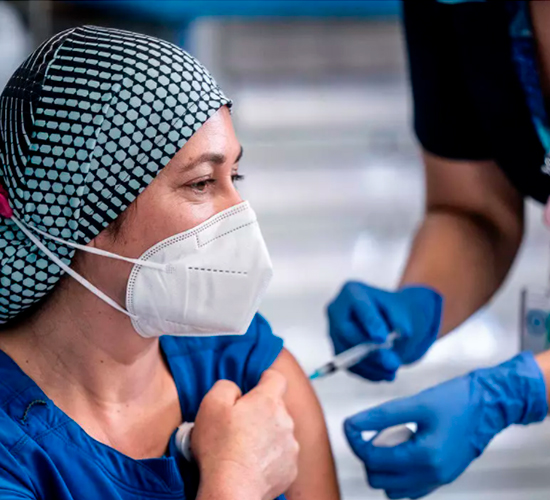Chile starts coronavirus vaccination with its medical staff

“We're going to have to stay on alert and vigilance, because the vaccine is not 100% (Effective) and this virus has been amazing in its behavior. People in parallel are going to have to maintain care, wearing masks in situations such as buses or the Metro”, explained to the AFP, Catterina Ferreccio, epidemiological doctor, member of the Covid-19 Advisory Committee of the Ministry of Health.
A 46-year-old nursing assistant was the first person to receive the coronavirus vaccine from Pfizer/BioNTech laboratories in Chile, whose 10.000 first doses reached the country on Thursday and will be exclusively targeted at the front line of health personnel.
The vaccines arrived early at Santiago airport by plane from Belgium and their transfer was made in a caravan escorted by police to a distribution center. After this, the expected process of inoculation began at the Metropolitan Hospital, with a first injection to the nursing assistant, 46-year-old, Zulema Riquelme.
“I'm so excited., Nervous; are multiple emotions”, said Zulema before being immunized and answering president Sebastián Piñera's question, who oversaw the process and asked how it felt to be the first person vaccinated against coronavirus in Chile.
“You are the hope of all”, the representative told him.
Riquelme has been working at the Hospital Sotero del Río for 26 years, in the commune of Puente Alto, one of the most populous in Santiago. She was selected by the government among the five health workers to receive the vaccine.
After Zulema, were vaccinated by a doctor, a nurse, a respiratory kinesiologist and a service assistant.
“Each represents a number of those who work daily in the Intensive Care Units of various public hospitals, being the ‘first line’ defense against the virus”, was explained in an official statement.
Mexico, in Latin America, vaccination with the Pfizer vaccine also began on Thursday and the first doses were received in Costa Rica. In Argentina, came a first batch of 300.000 Sputnik V vaccine.
– Vaccinating 15 million in the first half of 2021 –
The official plan envisages vaccinating 15 of the country's 18 million inhabitants during the first half of 2021. The first doses will go to all medical personnel working in Intensive Treatment Units with critical patients in the Regions of La Araucanía, Biobío and Magellan, in southern Chile and which today accumulate the greatest amount of contagion.
It will also cover one-third of medical staff in the Metropolitan Region, where 7 lives,1 million inhabitants, about half of the country's total population.
The rest of the health personnel will then be vaccinated, older adults and the chronically ill, who are most at risk in case of contagion. And finally, the general population will be immunized.
According to President Piñera, Chile managed to ensure a total supply of 30 million doses of the vaccine, following an agreement guaranteeing access to 10 million doses of the Pfizer/BioNTech vaccine and the same amount from The Chinese laboratory Sinovac.
Another 10 million were commissioned after agreements reached with AstraZeneca-Oxford laboratories, Janssen de Johnson & Johnson and the global COVAX initiative.
The government's intention is that the bulk of the highest-risk critical group, composed of approximately five million people, can be vaccinated during the first trimester of 2021.
Specialists highlight how quickly Chile gained access to the vaccine, but warn that the country should remain on alert.
“We're going to have to stay on alert and vigilance, because the vaccine is not 100% (Effective) and this virus has been amazing in its behavior. People in parallel are going to have to maintain care, wearing masks in situations such as buses or the Metro”, explained to the AFP, Catterina Ferreccio, epidemiological doctor, member of the Covid-19 Advisory Committee of the Ministry of Health.
Ferreccio also expressed its apprehensions about the time when the 30 million doses of vaccines will actually be available.
Another 240 should arrive in Chile during January.000 dose of vaccines, as the Minister of Health said, Enrique Paris.
